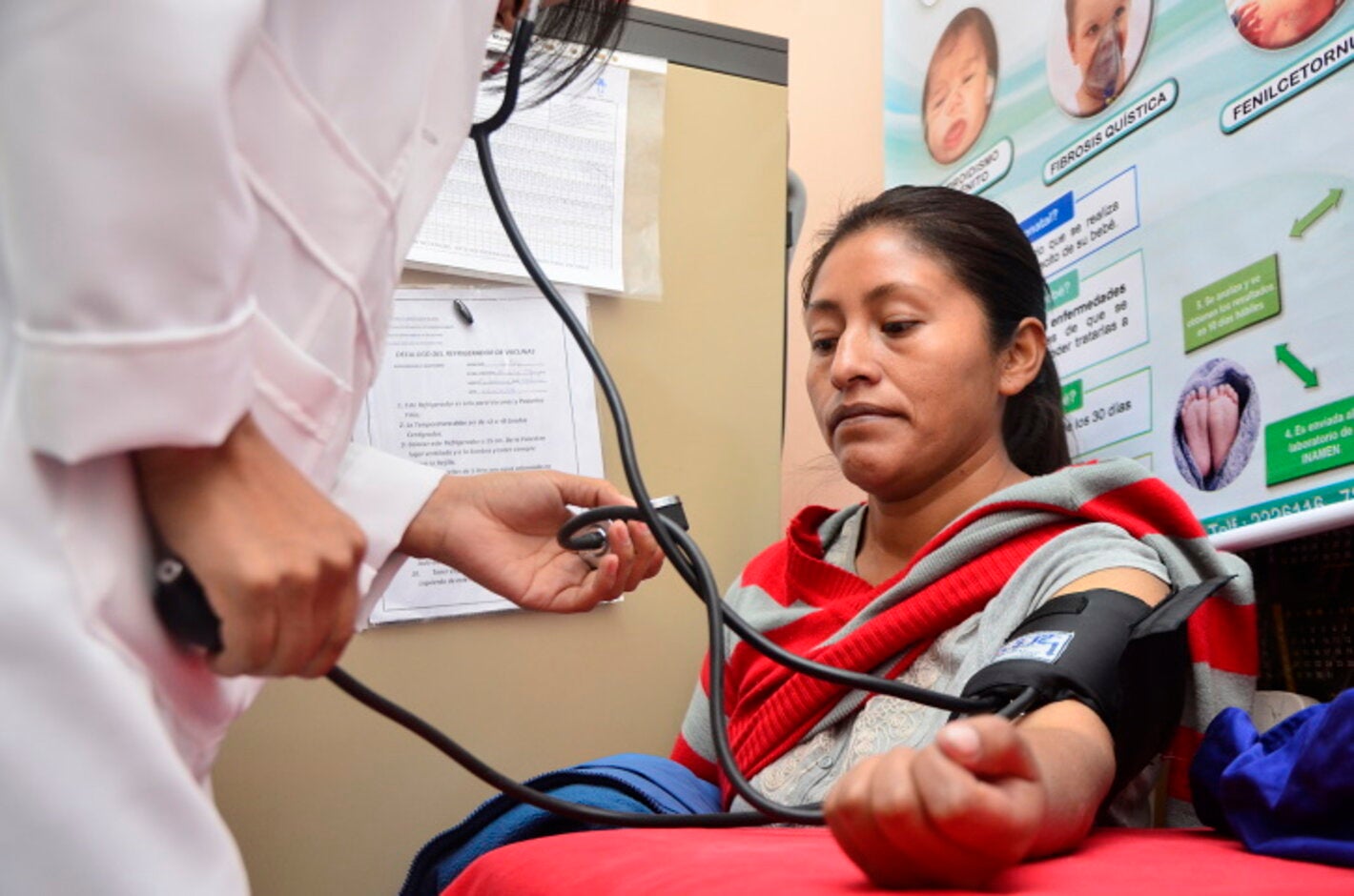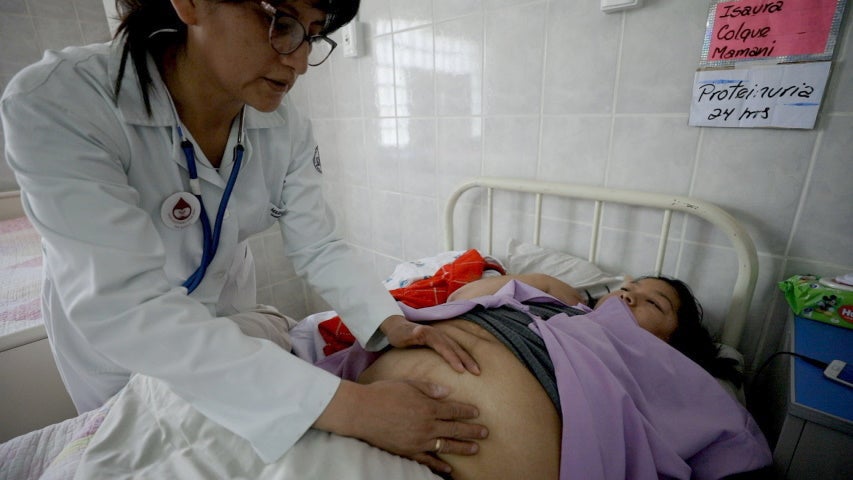
La Paz, August 31, 2021 (PAHO/WHO)- The Bolivian Ministry of Health and Sports (MSD for its acronym in Spanish), together with the Latin American Center for Perinatology, Women's and Reproductive Health (CLAP/WRH), the Representation of the Pan American Health Organization/World Health Organization (PAHO/WHO) in Bolivia, and the Bolivian Society of Obstetric Gynecology today launched the initiative to implement immediate contraception post obstetrical events (ICPOE) in hospitals in La Paz and Oruro. They also launched two courses that will strengthen the capacities of personnel working in women's and maternal health.
The core objective of these initiatives is to develop competencies in the provision of contraceptive methods, as well as to invest in the rights and empowerment of adolescent girls and women in Bolivia.
The virtual launch event took place on August 31, 2021, at 11:00 a.m., Bolivia Time, and was attended by over 498 stakeholders. Starting the ICPOE initiative in Bolivia required coordination between the MSD, CLAP, PAHO/WHO and the Bolivian Society of Obstetric Gynecology (SBGO). The initiative will be implemented in a pilot phase in La Paz (El Alto) and Oruro during 2021 and is to be expanded throughout the country in 2022.
CLAP director Suzanne Serruya praised the coordination process in the country and the institutional will of the Ministry of Health, and the actors involved. She highlighted the impact this capacity-building process will have on health care workers but, most especially, on the health of women and mothers. “Contraception is the most effective way to reduce maternal mortality because it allows better planning of sexual and reproductive life, and allows for the timeliest family building,” Serruya pointed out in her speech.
Two free interactive family planning and ICPOE courses were also launched. One of them - on Family Planning - targets health professionals at the first level of care. This comprehensive course that was designed for online self-administration delves into the concepts of contraceptive methods. The ICPOE course, on the other hand, is aimed at doctors and midwives in hospitals that provide care to pregnant women at childbirth and women presenting for and/or undergoing abortion. This course presents various self-instruction methodologies and is complemented with simulation and supervised in-person clinical practice with acquisition of skills in a tutored model. All the participants of this initiative must pass the two basic courses that later require moving forward into clinical practice.
The regional advisor on Sexual and Reproductive Health CLAP/WRH PAHO/WHO, Rodolfo Gómez, explained that the course on Family Planning (FP) for the First Level of Care taps on the contents of the Global Handbook for Providers, which provides clear and up-to-date information and advice to help providers meet the clients’ contraception needs, while providing the rationales for the choice and usage by clients. This course takes that content and - with the advice of experts - creates an innovative interactive remote course. The proposal provides guidance on the initiation of continuous contraception following the use of emergency contraception and highlights opportunities for task-sharing among providers to increase the availability of access to contraceptive methods. The proposal also includes the latest WHO guidance on hormonal contraception and HIV infection, and contraceptive options and provision of contraception in the event of disasters and pandemics.
The course on Immediate Contraception Post Obstetric Event (ICPOE) incorporates the WHO guidelines for contraception in the immediate postplacenta and postabortion periods as its primary content, in line with the concepts of the 2015 Medical Criteria for Eligibility of Contraceptive Methods. This course has an initial stage of self-learning, which is followed by a preclinical and clinical simulation in coordination with a team of qualified tutors.
“Individuals and couples have the right to decide responsibly and freely the number of children we want to have, the spacing of births, when we want to have children and we have the right to have the education and the necessary means to be able to decide responsibly and thus reach the highest level of sexual and reproductive health,” expressed international advisor Alfonso Tenorio, representing PAHO/WHO..
For the ICPOE iniciative
As part of the implementation of the initiative for the Immediate Contraception Post Obstetric Event (ICPOE) in hospitals in La Paz and Oruro, the Bolivian Ministry of Health (MSD) together with CLAP/PAHO/WHO are training three qualified trainers, which includes offering them complementary courses on working with adults, management of virtual platforms and practical inputs for the development of competencies based on simulation with teachers based in Washington and Uruguay. In addition, 11 participants selected in each area (La Paz, El Alto and Oruro) will go through a competence development process in a synchronous and asynchronous virtual environment, followed by simulation and clinical practice inserting postpartum and postabortion IUDs, as well as implants. This work is supported by and in coordination with the affiliate branches of the Bolivian Society of Obstetrics and Gynecology and the Departmental Health Services of Oruro, La Paz and El Alto (SEDES and SERES).
The obstetricians chosen committed to replicate what they have learned, training other professionals, to provide the entire (public and social security) health care system with professionals working with ICPOE in the short term. Starting with obstetricians and residents, the plan is to finally reach general practitioners and nurses.
Meeting goals
The Sustainable Development Goals and the Global Strategy for Women's, Children's and Adolescents' Health call for universal access to family planning services, especially for the most vulnerable populations, and to reduce the unmet need for family planning.
Universal access to modern and effective contraception ensures that women and adolescent girls can avoid the adverse consequences of unintended pregnancies. In this regard, family planning service providers form the basis of health systems' response to these challenges, especially at critical times such as those posed by the COVID-19 pandemic.
###
Established in 1902, PAHO is the oldest international public health organization in the world. It works with its member countries to improve the health and quality of life of the peoples of the Americas. It also serves as the Regional Office for the Americas of the World Health Organization (WHO).
The Latin American Center for Perinatology/Women's and Reproductive Health (CLAP/SMR) of the Pan American Health Organization (PAHO) provides technical cooperation of excellence to promote, strengthen and improve health care for women, mothers, and newborns in the countries of the Region of the Americas. It was created in 1970 in Montevideo and is currently part of the Department of Family and Health Promotion and Life Course.




